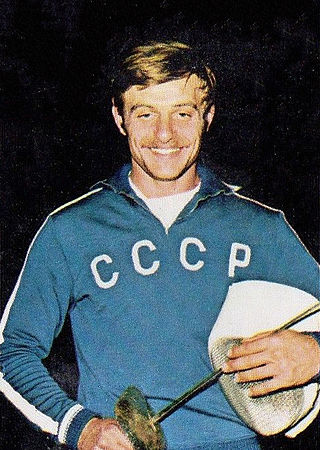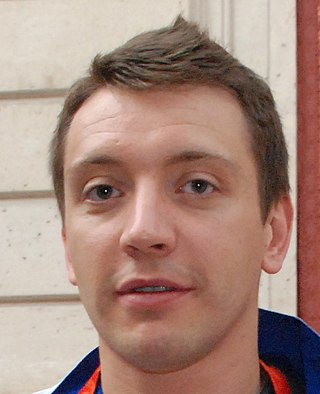
Aldo Nadi was one of the greatest Italian fencers of all time.

Nedo Nadi was one of the best Italian fencers of all time. He is the only fencer to win a gold medal in each of the three weapons at a single Olympic Games and won the most fencing gold medals ever at a single Games—five. Nadi won six Olympic gold medals in total.

Viktor Alexandrovich Sidyak is a Russian former left-handed sabre fencer, a pupil of Mark Rakita and David Tyshler. He was known for his aggressive style and the "one-and-a-half tempo attack".

Aleksey Andreyevich Yakimenko is a Russian sabre fencer, eight-time team world champion, eleven-time European champion, and team bronze medallist in the 2004 Summer Olympics. He won the Fencing World Cup series three times, with fifteen titles to his name, and earned five gold medals in the Universiade.
Zsolt Nemcsik is a Hungarian sabre fencer. He competed at three Olympic Games.

Won Woo-young is a South Korean sabre fencer. He won gold at the Olympics, World Championships, Asian Games and Asian Championships and is the first Asian fencer to win gold in the men's individual sabre event at the World Championships.

Julien Pillet is a French sabre fencer. He is a three-time Olympic medalist: he won gold medals in the sabre team events at the 2004 Summer Olympics and 2008 Summer Olympics, and a silver medal in the sabre team event at the 2000 Summer Olympics. He finished 4th in the individual sabre event at the 2008 Beijing Olympics.
Sergey Aleksandrovich Sharikov, also known as Serguei/Sergei Charikov, was a left-handed Russian Olympic champion sabre fencer. In the Olympics he won two gold medals, a silver medal, and a bronze medal.

The men's sabre was a competition in fencing at the 2004 Summer Olympics in Athens. A total of 39 men from 21 nations competed in this event. Nations had been limited to three fencers each since 1928. Competition took place in the Fencing Hall at the Helliniko Olympic Complex on August 14. The event was won by Aldo Montano of Italy, the nation's first victory in the men's sabre since 1920. Montano accomplished what his grandfather and father, both world champions in the individual event and Olympic medalists in the team competition, had not been able to: Olympic gold in the individual event. Zsolt Nemcsik of Hungary took silver while Vladislav Tretiak earned Ukraine's first medal in the event with his bronze. France's five-Games medal streak ended.

The men's sabre fencing competition at the 2008 Summer Olympics in Beijing took place on August 12 at the Olympic Green Convention Centre. There were 40 competitors from 21 nations. The event was won by Zhong Man of China, the nation's first medal in the men's sabre. Nicolas Lopez's silver put France back on the podium after a one-Games absence. Mihai Covaliu of Romania became the 13th man to win multiple medals in the event, adding a bronze to his 2000 gold medal.

Nicolas Limbach is a German fencer, world champion in 2009 and team world champion in 2014. He won the Fencing World Cup in 2008–2009, 2009–2010 and 2011–2012.
Aldo Montano was an Italian fencer. He won a silver medal in the team sabre event at the 1936 and 1948 Summer Olympics. His son, Mario Aldo Montano, and grandson Aldo Montano, also competed at the Olympic Games for Italy as fencers.

The men's sabre was one of seven fencing events on the fencing at the 1948 Summer Olympics programme. It was the eleventh appearance of the event. The competition was held from 12 August 1948 to 13 August 1948. 60 fencers from 24 nations competed. Nations were limited to three fencers each. The event was won by Aladár Gerevich, the fifth of nine straight Games in which a Hungarian would win the event. Gerevich became the third man to win multiple medals in the individual sabre, adding to his 1936 bronze. Vincenzo Pinton of Italy took silver and Pál Kovács of Hungary took bronze; it was the third straight Games where the sabre podium was Hungary-Italy-Hungary.

Mario Aldo Montano is an Italian fencer. He won a gold and two silver medals in the team sabre at three Olympic Games. He also competed at the Mediterranean Games in the individual sabre event where he won silver medals in 1975 and 1979 and a bronze medal in 1971.
Mario Tullio Montano was an Italian fencer. He won a gold medal in the team sabre event at the 1972 Summer Olympics and a silver in the same event at the 1976 Summer Olympics.

The men's sabre was one of eight fencing events on the fencing at the 1976 Summer Olympics programme. It was the eighteenth appearance of the event. The competition was held from 21 to 22 July 1976. 46 fencers from 18 nations competed. Nations had been limited to three fencers each since 1928. The event was won by Viktor Krovopuskov of the Soviet Union, the nation's second consecutive victory in the men's sabre. The Soviet Union's two gold medals in the event moved it out of a six-way tie into sole possession of second place all-time, after Hungary with 11. The Soviet team swept the men's sabre medals in 1976, with Vladimir Nazlymov taking silver and Viktor Sidyak bronze. It was the third sweep in the event. Nazlymov and Sidyak were the eighth and ninth men to win multiple medals in the event. Excluding matches against each other, the three Soviets went 48–3 during the tournament. For the first time since 1900, Hungary competed in the men's sabre but did not win a medal.

The men's sabre was one of eight fencing events on the fencing at the 1980 Summer Olympics programme. It was the nineteenth appearance of the event. The competition was held from 24 to 25 July 1980. 30 fencers from 12 nations competed. Nations had been limited to three fencers each since 1928. The event was won by defending champion Viktor Krovopuskov of the Soviet Union, the nation's third consecutive victory in the event. Krovopuskov was the third man to successfully defend a sabre title and the 10th man to win two medals of any color in the event. His teammate Mikhail Burtsev took silver. Imre Gedővári's bronze medal returned Hungary to the podium after a one-Games absence broke an eleven-Games streak.

The men's sabre competition in fencing at the 2012 Summer Olympics in London was held on 29 July at the ExCeL London Exhibition Centre. There were 37 competitors from 21 nations. Hungary's Áron Szilágyi won the gold medal, beating Diego Occhiuzzi of Italy won took silver. Nikolay Kovalev from Russia won the bronze. Szilágyi's gold medal was Hungary's 13th in the men's sabre.

Rareș Dumitrescu is a Romanian sabre fencer, World silver medal in 2009. With the Romanian team he was European champion in 2006, World champion in 2009 and Olympic team silver medal in 2012.















